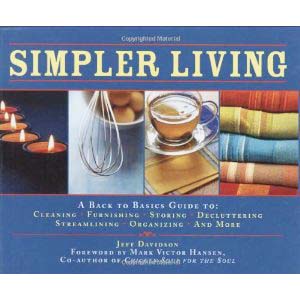Simpler Living
Foreword to Simpler Living
There is a fascinating book by Benard Grun called The Timetables of
History–A Horizontal Linkage of People and Events. Starting from 5000
B.C. and proceeding to the present, the book chronicles the development of
humankind in the areas of history and politics, literature and the arts,
religion, philosophy, learning, visual arts, music, science, technology,
growth, and daily life. The time interval for the early years chronicled
is 1,000 years, decreasing quickly to 500 years, and then to 100 years by
1000 B.C. It shrinks to 50 years until 500 A.D.; thereafter, the
developments of humankind are listed one year at a time.
More People, More Milestones
As you proceed through The Timetables of History, drawing ever closer to modern day, the time intervals depicted become shorter. Predictably, the notable items increase with each passing year, and as the book moves toward the 20th century, the number of items listed begins to grow at a feverish pace. You can readily see that there are more achievements and noteworthy items listed per year in the latter years than in entire centuries 1,500 or more years ago. And why not?
When the world contained only a few million people, such as in the height of Greek civilization, the small population predictably generated fewer breakthroughs and milestones than the number generated in this present era. Connecticut alone presently has a population which exceeds that of the world in 200 B.C.
A Vast Potential for Complexity
Today, as Jeff Davidson so eloquently observes, in a world population soon to approach seven billion people who are interconnected by economics, ecology, communication and transportation (and with 85% of the scientists who have ever lived alive today), the potential for more complexity in your life is ripe.
In writing this book, Jeff Davidson told me that he wanted to accomplish something new. In his research, he came across scores and scores of books on the general topic of simplicity starting from the mid-70s right up through the present. Alas, one or more of the following elements characterized virtually all of the books he encountered:
- Books relying on affirmations or one-a-day-type suggestions seldom
offered a comprehensive approach to making one’s life simpler. Many such
books were simply philosophical and not prescriptive at all.
- Some books on simplicity focused either on one’s personal or
professional life but infrequently on both. Some books suggested to
readers that simplicity is most readily attained by withdrawing from
many aspects of their lives or from buy viagra online melbourne society as a whole.
- Some books offered suggestions that, taken at face value, would
re-complicate other aspects of their readers’ lives (i.e. if you gave up
ALL of your credit cards, you’d set yourself up for some very trying
times).
- He found that books focusing on organizing could help readers
achieve some sense of simplicity; however, such books generally dealt
only with structuring one’s workplace or home. Finally, books focusing
on stress could help readers achieve some sense of simplicity, but such
books generally did not address the nitty gritty of structuring one’s
environment for simplicity.
Compiling a Unique Text
Jeff’s mission, then, became one of compiling what had not been compiled before. He decided to put together a room-by-room, space-by-space look at what the typical man and woman in America and throughout the post-industrial world could do to make their lives simpler. The sheer number of suggestions Jeff derived is staggering, and in a sense, paradoxical. After all, with nearly two thousand tips on how to simplify your life, anyone could readily conclude that what’s offered isn’t simplicity but another version of complexity.
Jeff suggests that no one read the book from cover-to-cover or attempt to incorporate anything except a fraction of the tips offered. Rather, he advises that you peruse chapters as you need or want to, glean those tips that make the most sense for you, and act on them. Have the strength to leave the rest, because your quest for simplicity will grow complex in itself if you attempt to do too much.
Happily, if you take even a few vital steps offered in any one of the 24 chapters, you’re likely to receive significant benefit.
Illuminating
I found Simpler Living to be enjoyable, illuminating reading. The tips are not only practical and sensible (something you’d expect in a book such as this), but also arranged in an intelligent sequence and offered in a friendly manner with a bit of mirth. Simpler Living is a book to be retained, to be referred to periodically or as often as you notice the level of complexity in your life edging upward. It is a book to share with a spouse, a co-worker, and even a friend. It is a book that belongs on the closest shelf, that should be given to all of your friends as a gift, and one whose message ought to stay in the front burner of your mind.
The simple reality of our times is that life for 21st century men and women has become too complex. Fortunately, the antidote is in your hands.
May your reading experience be as enjoyable, illuminating, and compelling as mine has been.
Mark Victor Hansen
Newport Beach, CA
Read the Introduction to Simpler Living




